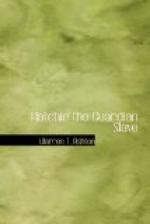“Is this the daughter
of a slave? I know
’Tis not with
men as shrubs and trees, that by
The shoot you know the
rank and order of
The stem. Yet who
from such a stem would look
For such a shoot?”
Knowles.
The morrow came. Emily was summoned to the library, to hear the reading of her father’s will. With her no worldly consideration could mitigate the deep grief that pervaded her heart. She derived her only consolation from a purer, higher source. She was a true mourner, and the acquisition of the immense fortune of which she was the heiress was not an event which could heal the wound in her heart. She looked not forward to the bright scenes of triumph and of conquest that awaited her. She was not dazzled by the brilliancy of the position to which wealth and an honorable name entitled her. Such thoughts never occurred to her. She did think of Henry Carroll; but not in the proud situation to which her wealth might elevate him, but as a pure heart that would beat in unison with her own, that would sympathize with her in her hour of sorrow; as one who would mingle his tears with hers, over the bier of a common parent. She was not sentimental in her love, nor in her grief. Sighs and tears with her were not a sentimental commodity,—an offering which the boarding-school miss makes alike at the altar of her love, or at the shrine of a dead parent’s memory. The desolation of heart and home was not a trial which wealth and honors could adorn with tinsel, and thus render it desirable, or even tolerable!
Emily Dumont entered the library. The occasion was repugnant to her feelings. The unceremonious blending of dollars and cents with the revered name of her father was extremely painful to her sensibility. It seemed like a profanation of his memory.
Her uncle, Maxwell, the witnesses of the will, and several others,—intimate friends of the family,—were already there. On Jaspar’s countenance were no tell-tale traces of the last night’s villany. He looked gloomy and sorrowful. So thoroughly had he schooled himself in hypocrisy for this occasion, that the scene he knew would, in a few minutes, transpire, had no prophetic indications in his features. Like the tragedian who is tranquil and unaffected in the scene in which he knows his own death or triumph occurs, Jaspar was calm, and his aspect even sanctimonious.
As Emily entered Maxwell tendered his sympathies in his usual elegant manner, and so touchingly did he allude to the death of her father that with much difficulty she restrained a flood of tears. The scene in the office, and the disfavor with which she had lately regarded him, were forgotten in his eloquence.
After this courtesy to the daughter of his former patron, Maxwell again seated himself, and after briefly and formally stating the reasons of their meeting, to which he added a short but apparently very feeling eulogy of the deceased, he took the packet from the safe, and proceeded to break the seals.




